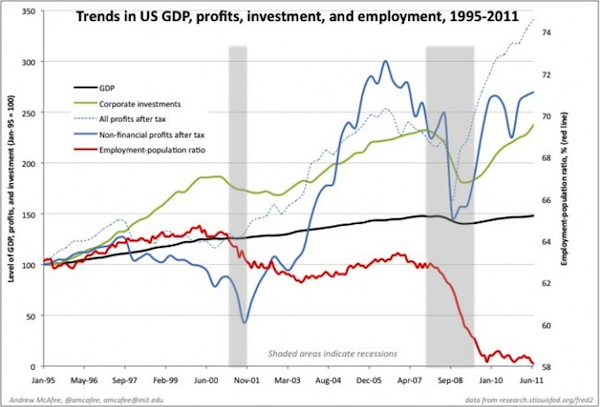- Debt: The First 5,000 Years — Throughout its 5000 year history, debt has always involved institutions – whether Mesopotamian sacred kingship, Mosaic jubilees, Sharia or Canon Law – that place controls on debt’s potentially catastrophic social consequences. It is only in the current era, writes anthropologist David Graeber, that we have begun to see the creation of the first effective planetary administrative system largely in order to protect the interests of creditors. (via Tim O’Reilly)
- Know Your History — where Google’s +1 came from (answer: Apache project).
- MIT Autonomous Quadcopter — MIT drone makes a map of a room in real time using an X Box Kinect and is able to navigate through it. All calculations performed on board the multicopter. Wow. (via Slashdot and Sara Winge)
- How Great Entrepreneurs Think — leaving aside the sloppy open-mouth kisses to startups that “great entrepreneurs” implies, an interesting article comparing the mindsets of corporate execs with entrepreneurs. I’d love to read the full interviews and research paper. Sarasvathy explains that entrepreneurs’ aversion to market research is symptomatic of a larger lesson they have learned: They do not believe in prediction of any kind. “If you give them data that has to do with the future, they just dismiss it,” she says. “They don’t believe the future is predictable…or they don’t want to be in a space that is very predictable.” […] the careful forecast is the enemy of the fortuitous surprise. (via Sacha Judd)
"entrepreneurship" entries

Julia Ko on developing a different kind of smartphone
The O’Reilly Solid Podcast: Entrepreneurship, niche product development, and spotting business opportunities.
Subscribe to the O’Reilly Solid Podcast for insight and analysis about the Internet of Things and the worlds of hardware, software, and manufacturing.
Many of the hardware creators we speak with come into their work through the enthusiast route: they start with an engineering problem they want to solve or a piece of technology they think is interesting, then look for an application that would support a business.
Julia Ko, our guest on this week’s episode of the Solid Podcast, started her company SurePod a very different way. She saw the business opportunity first, studying wholesale mobile contracts and the sales networks that distribute medical devices, and she developed a plan for a simplified mobile phone for older people. Only then did she learn the technical aspects of hardware production.
In this episode, we talk about Ko’s development as an entrepreneur, the challenge of creating a product for which you aren’t the target audience, and the best mobile phone carrier (Ko says it’s AT&T).

An innovation agenda to help people win the race against the machines
Policy recommendations to get the engines of democracy firing on all cylinders.
If the country is going to have a serious conversation about innovation, unemployment and job creation, we must talk about our race against the machines. For centuries, we’ve been automating people out of jobs. Today’s combination of big data, automation and artificial intelligence, however, looks like something new, from self-driving cars to e-discovery software to “robojournalism” to financial advisors to medical diagnostics. Last year, venture capitalist Marc Andreessen wrote that “software is eating the world.”
Computers and distributed systems are now demonstrating skills in the real world that we once thought would always be the domain of human beings. “That’s just not the case any more,” said MIT research professor Andrew McAfee, in an interview earlier this year at the Strata Conference in Santa Clara, Calif.:
McAfee and his research partner, MIT economics professor Erik Brynjolfsson, remain fundamentally optimistic about the effect of the digital revolution on the world economy. But the drivers of joblessness that they explore in their book, Race Against The Machine, deserved to have had more discussion in this year’s political campaign. Given the tepid labor market recovery in the United States and a rebound that has stayed flat, the Obama administration, given an opportunity for a second term, should pull some new policy levers.
What could — or should — the new administration do? On Tuesday, I had the pleasure of speaking at a panel at the Center for Technology Innovation at the Brookings Institute to talk about what a “First 100 Days Innovation Agenda” might look like for the new administration. (Full disclosure: earlier this year, I was paid to moderate a workshop that discussed this issue and contributed to the paper on building an innovation economy that was published this week.) The event was live streamed and is available on-demand.
Below are recommendations from the paper and from professors McAfee and Brynjolfsson, followed by the suggestions I made during the forum, drawing from my conversations with people around the United States on this topic over the past two years.

Creating the ideal conditions for tech startups
European tech entrepreneurs have concerns about startup environments.
Creating economic conditions that are beneficial to startups is increasingly important for governments. What are the factors that will attract and retain top talent?


Four short links: 31 March 2011
Historic Debt, Historic Naming, Autonomous Quadcopter, and Entrepreneurial Thought


Four short links: 14 March 2011
Future Retrospective, Political Entrepreneurs, Library DRM, and In-Database Analytics
- A History of the Future in 100 Objects (Kickstarter) — blog+podcast+video+book project, to have future historians tell the story of our century in 100 objects. The BBC show that inspired it was brilliant, and I rather suspect this will be too. It’s a clever way to tell a story of the future (his hardest problem will be creating a single coherent narrative for the 21st century). What are the 100 objects that future historians will use to sum up our century? ‘Smart drugs’ that change the way we think? A fragment from suitcase nuke detonated in Shanghai? A wedding ring between a human and an AI? The world’s most expensive glass of water, returned from a private mission to an asteroid? (via RIG London weekly notes)
- Entrepreneurs Who Create Value vs Entrepreneurs Who Lock Up Value (Andy Kessler) — distinguishes between “political entrepreneurs” who leverage their political power to own something and then overcharge or tax the crap out of the rest of us to use it vs “market entrepreneurs” who recognize the price-to-value gap and jump in. Ignoring legislation, they innovate, disintermediate, compete, stay up all night coding, and offer something better and cheaper until the market starts to shift. My attention was particularly caught by for every stroke of the pen, for every piece of legislation, for every paid-off congressman, there now exists a price umbrella that overvalues what he or any political entrepreneur is doing. (via Bryce Roberts)
- Harper-Collins Caps eBook Loans — The publisher wants to sell libraries DRMed ebooks that will self-destruct after 26 loans. Public libraries have always served and continue to serve those people who can’t access information on the purchase market. Jackass moves like these prevent libraries from serving those people in the future that we hope will come soon: the future where digital is default and print is premium. That premium may well be “the tentacles of soulless bottom-dwelling coprocephalic publishers can’t digitally destroy your purchase”. It’s worth noting that O’Reilly offers DRM-free PDFs of the books they publish, including mine. Own what you buy lest it own you. (via BoingBoing and many astonished library sources)
- MAD Lib — BSD-licensed open-source library for scalable in-database analytics. It provides data-parallel implementations of mathematical, statistical and machine learning methods for structured and unstructured data. (via Ted Leung)

Innovation Lessons in "Start-Up Nation"
Start-Up Nation: The Story of Israel’s Economic Miracle
investigates the social, historical, and psychological traits that
produce extraordinarily creative people–and significantly, creative
people who can translate their cranial light-bulbs into technologies
with the potential to change the world.

